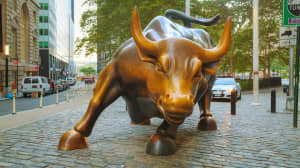Stocks have surged this year without really anything going right, besides the rolling out of error-prone artificial intellligence chatbots. Interest rates have surged to a 22-year high, earnings are down from last year, and pandemic-era savings are being drawn down if not entirely exhausted.
Read more: Those extra pandemic savings are now wiped out, Fed study finds.
Strategists at Bank of America led by Michael Hartnett have an interesting theory.
“Asset price overshoots [are] the new normal,” they say.
Consider:
-
Oil
CL00,
+0.77% went from -$37 in April 2020 to $123 in March 2022, then down to $67 the following 12 months. -
Bitcoin
BTCUSD,
+0.42% went from $5,000 in January 2020 to $68,000 in November 2021, down to $16,000 a year later, and up to $29,000 now. - The S&P 500 went from 3300 to 2200 to 4800 to 3500 to 4600 thus far in 2020s.
“AI is simply the new overshoot,” they say.
The S&P 500
SPX,
Hartnett and team noted that real retail sales — that is, adjusted for inflation — fell at a 1.6% year-over-year clip, which has coincided with recessions since 1967. Real retail sales falls in excess of 3% are associated with hard recessions.
Historically, a 2-3 point rise in the savings rate also is recessionary, and already it’s risen from 3% to 4.6%. The unemployment rate so far hasn’t risen, though a 0.5 point to 1 point rise in the jobless rate also is typically recessionary.
“It would be so ‘2020s’ for the economy to hit a brick wall just as everyone punts ‘soft landing’ into 2024,” they say.
They like emerging market/commodities as summer upside plays and credit and tech as autumn downside plays.







